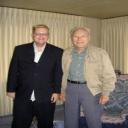Yahoo Answers is shutting down on May 4th, 2021 (Eastern Time) and beginning April 20th, 2021 (Eastern Time) the Yahoo Answers website will be in read-only mode. There will be no changes to other Yahoo properties or services, or your Yahoo account. You can find more information about the Yahoo Answers shutdown and how to download your data on this help page.
Trending News
Jesus says in Mark?
Jesus says in Mark regarding Elijah that Elijah has already come and was abused. Some say Elijah was also John The Baptists. This makes no sense to me. Are John the baptist and Elijah separate and has Elijah already come and if so when and how was he abused. ANy help would be greatly appreciated. Thanks in advance
4 Answers
- Glenn SLv 74 years agoFavorite Answer
No, John the Baptist was not a reincarnated Elijah.
Matthew 11:7–14 declares, “Jesus began to speak to the crowd about John: ‘What did you go out into the desert to see? A reed swayed by the wind? If not, what did you go out to see? A man dressed in fine clothes? No, those who wear fine clothes are in kings’ palaces. Then what did you go out to see? A prophet? Yes, I tell you, and more than a prophet. This is the one about whom it is written: “I will send my messenger ahead of you, who will prepare your way before you.” I tell you the truth: Among those born of women there has not risen anyone greater than John the Baptist; yet he who is least in the kingdom of heaven is greater than he. From the days of John the Baptist until now, the kingdom of heaven has been forcefully advancing, and forceful men lay hold of it. For all the Prophets and the Law prophesied until John. And if you are willing to accept it, he is the Elijah who was to come.’” Here Jesus quotes from Malachi 3:1, where the messenger appears to be a prophetic figure who is going to appear. According to Malachi 4:5, this messenger is “the prophet Elijah,” whom Jesus identifies as John the Baptist. Does this mean that John the Baptist was Elijah reincarnated? Not at all.
First, Jesus’ original hearers (and Matthew’s original readers) would never have assumed Jesus’ words to refer to reincarnation. Besides, Elijah did not die; he was taken to heaven in a whirlwind as he rode in a chariot of fire (2 Kings 2:11). Arguing for a reincarnation (or a resurrection) of Elijah misses that point. If anything, the prophecy of the Elijah “to come” would have been viewed as Elijah’s physical return to earth from heaven.
Second, the Bible is quite clear that John the Baptist is called “Elijah” because he came in the “spirit and power of Elijah” (Luke 1:17), not because he was Elijah in a literal sense. John the Baptist is the New Testament forerunner who points the way to the arrival of the Lord, just as Elijah filled that role in the Old Testament (and might again in the future—see Revelation 11).
Third, Elijah himself appears with Moses at Jesus’ transfiguration after John the Baptist’s death. This would not have happened if Elijah had changed his identity into that of John (Matthew 17:11–12).
Fourth, Mark 6:14–16 and 8:28 show that both the people and Herod distinguished between John the Baptist and Elijah.
Finally, proof that this John the Baptist was not Elijah reincarnated comes from John himself. In the first chapter of John the Apostle’s gospel, John the Baptist identifies himself as the messenger of Isaiah 40:3, not as the Elijah of Malachi 3:1. John the Baptist even goes so far as to specifically deny that he was Elijah (John 1:19–23).
John did for Jesus what Elijah was to have done for the coming of the Lord, but he was not Elijah reincarnated. Jesus identified John the Baptist as Elijah, while John the Baptist rejected that identification. How do we reconcile these two teachings? There is a key phrase in Jesus’ identification of John the Baptist that must not be overlooked. He says, “If you are willing to accept it, he is Elijah.” In other words, John the Baptist’s identification as Elijah was not predicated upon his being the actual Elijah, but upon people’s response to his role. To those who were willing to believe in Jesus, John the Baptist functioned as Elijah, for they believed in Jesus as Lord. To the religious leaders who rejected Jesus, John the Baptist did not perform this function.
- username_hiddenLv 74 years ago
In one sense 'Elijah' is a prophetic reference to John the Baptist. It's figurative language, a bit like where St Paul calls Jesus 'the last Adam' (1 Cor 15:45)
In another sense, you should remember that Jesus spoke those words just after the Transfuguration, where he appeared in glory with Moses and Elijah alongside him. This means that, in a more literal sense, Elijah had just come.
- RickyLv 44 years ago
Elijah was enthusiastic about his work for God.
In that SAME spirit, John the Baptist carried out his duties.
- Tatty TailsLv 74 years ago
Through the prophet Malachi, another “great and dreadful day of the LORD” (KJB) was foretold, and it was said that it would be preceded by the coming of “Elijah the prophet.” (Mal 4:5, 6) The original Elijah had lived some 500 years before that prophecy was uttered, but in the first century C.E. Jesus indicated that John the Baptizer was the foretold counterpart of Elijah. (Mt 11:12-14; Mr 9:11-13) So at that time a “day of the LORD” was near at hand. At Pentecost of 33 C.E., Peter explained that what was occurring was the fulfillment of Joel’s prophecy (Joe 2:28-32) concerning the outpouring of God’s spirit and that this too was due to happen before “the great and glorious day of the LORD.” (Ac 2:16-21) That “day of the LORD” came in 70 C.E., when, in fulfillment of his Word, Jehovah caused the armies of Rome to execute divine judgment upon the nation that had rejected the Son of God and defiantly shouted: “We have no king but Caesar.”—Joh 19:15; Da 9:24-27.





